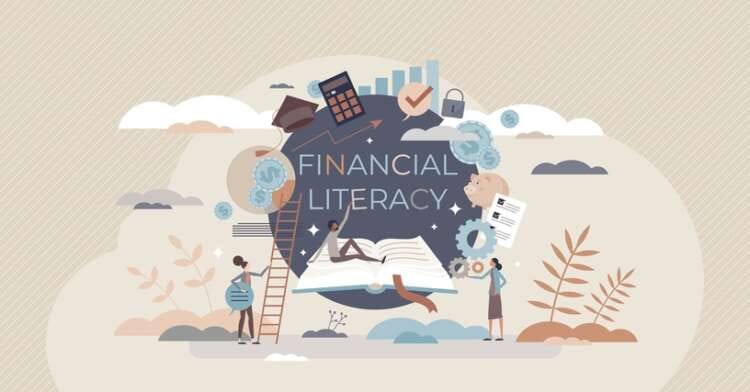
Why financial literacy is important
In today’s complex and ever-changing world, having a strong grasp of financial literacy has become increasingly vital. From making informed decisions to securing a stable future, financial literacy equips individuals with the skills and knowledge they need to navigate the intricate landscape of personal finance. This article explores why financial literacy is crucial, delving into various facets that highlight its significance.
Introduction
- Definition of financial literacy: Financial literacy refers to the ability to comprehend and manage various financial aspects effectively. It involves understanding concepts like budgeting, investing, debt management, and more. Essentially, it empowers individuals to make sound financial decisions that align with their goals.
- Growing significance in modern society: In today’s rapidly changing financial landscape, the significance of financial literacy has grown immensely. Complex financial products, digital transactions, and an unpredictable economy demand that individuals possess the skills to make informed choices.
Empowerment and decision-making
- Making informed financial decisions: Financial literacy empowers individuals to make informed choices about their money. Whether it’s buying a house, investing in stocks, or choosing a retirement plan, understanding the implications of these decisions can lead to more favorable outcomes.
- Budgeting and saving effectively: Budgeting is a foundational aspect of financial literacy. Knowing how to allocate funds for necessities, savings, and discretionary spending helps maintain financial stability and achieve long-term goals.
- Avoiding debt traps: A lack of financial literacy can lead to accumulating debt due to uninformed borrowing or credit card misuse. Understanding interest rates, repayment terms, and credit management helps individuals steer clear of crippling debt.
Long-term financial security
- Retirement planning: Financial literacy aids in planning for retirement, ensuring that individuals set aside adequate funds to maintain their quality of life after they stop working.
- Investment knowledge and wealth accumulation: Being financially literate enables individuals to understand investment options, assess risks, and strategize for wealth accumulation over time.
- Insurance and risk management: Understanding insurance types and their importance helps mitigate financial risks associated with unexpected events, such as accidents, illnesses, or natural disasters.
Navigating a complex financial landscape
- Understanding financial products and services: Financial products can be overwhelming, but financial literacy allows individuals to choose those that align with their needs, from bank accounts to mortgages.
- Interpreting credit scores and reports: A strong credit score is essential for favorable borrowing terms. Financial literacy equips individuals to understand credit reports, improve scores, and access better financial opportunities.
- Dealing with taxes and legal financial obligations: Navigating tax regulations and legal obligations can be daunting. Financial literacy ensures individuals are aware of their financial responsibilities and take advantage of tax-saving opportunities.
Economic and societal impact
- Reducing poverty and inequality: Financial literacy plays a role in reducing poverty by helping individuals make informed decisions that break the cycle of financial hardship.
- Strengthening overall economic health: When individuals make wise financial choices, they contribute to a stable economy with increased consumer spending and reduced financial crises.
- Lowering the burden on social welfare systems: A financially literate population is less reliant on social welfare systems, which can lead to more efficient resource allocation by governments.
Education and career advancement
- Negotiating salary and benefits: Financial literacy enables individuals to negotiate better salaries and benefits, ensuring fair compensation for their skills and expertise.
- Entrepreneurship and business financial management: Entrepreneurs with financial literacy are more likely to succeed, as they can manage business finances effectively and make informed decisions.
- Enhancing employability and job opportunities: Employers value candidates with financial literacy, as it demonstrates responsibility and the ability to manage company resources effectively.
Generation of informed consumers
- Identifying predatory practices: Financially literate individuals can recognize predatory practices such as hidden fees, high-interest loans, and fraudulent schemes, protecting themselves from financial exploitation.
- Demand for transparency from financial institutions: A financially literate society demands transparency from financial institutions, promoting fair practices and ethical conduct within the industry.
- Contributing to fair market competition: Informed consumers foster healthy market competition by choosing products and services that offer the best value, driving companies to innovate and improve offerings.
Teaching future generations
- Instilling responsible financial habits in children: Financial literacy education at an early age builds a foundation for responsible money management in children, setting them up for a financially secure future.
- Bridging the gap in school curricula: Incorporating financial literacy into school curricula equips students with practical skills that are essential for adulthood, reducing financial illiteracy rates in the long run.
- Creating a legacy of financially savvy individuals: A focus on financial education ensures that future generations are better equipped to make informed decisions, promoting financial stability and independence.
Psychological and emotional well-being
- Reducing financial stress and anxiety: Financial literacy diminishes stress by providing individuals with the tools to manage their finances, fostering a sense of control over their economic well-being.
- Building confidence in money matters: Understanding financial concepts boosts confidence in making financial decisions, even during uncertain times.
- Improving overall quality of life: Financial literacy contributes to an improved quality of life, as individuals can achieve their goals, pursue their passions, and enjoy life without financial constraints.
Adapting to technological advancements
- Navigating digital banking and transactions: Financial literacy prepares individuals to navigate digital platforms, ensuring safe and efficient online transactions.
- Protecting personal and financial data online: Awareness of cybersecurity measures safeguards personal and financial information from online threats.
- Embracing fintech for convenience and growth: Understanding financial technology allows individuals to leverage innovative tools for convenience, investment, and financial growth.
Overcoming barriers to financial literacy
- Socioeconomic disparities: Promoting financial literacy initiatives can help bridge the gap between socioeconomic groups, empowering marginalized communities.
- Cultural and linguistic challenges: Tailoring financial education resources to diverse cultures and languages ensures accessibility and inclusivity.
- Developing accessible learning resources: Creating user-friendly resources, workshops, and online courses makes financial education more accessible to all individuals.
Government and institutional initiatives
- Financial literacy programs and workshops: Governments and institutions play a vital role in promoting financial literacy by offering workshops, seminars, and online resources.
- Policy advocacy for integrating financial education: Advocating for the integration of financial education into formal education systems helps equip future generations with essential life skills.
- Collaboration with the private sector for public good: Partnerships between governments, institutions, and the private sector can amplify the impact of financial literacy initiatives.
Personal empowerment and fulfilment
- Achieving financial goals and dreams: Financial literacy enables individuals to set and achieve meaningful financial goals, such as buying a home, traveling, or starting a business.
- Gaining control over life’s trajectory: With financial literacy, individuals have more control over their life’s trajectory, making decisions that align with their values and aspirations.
- Building a stronger future for oneself and family: Financially literate individuals can secure a stable future for themselves and their families, passing down the knowledge and habits that promote financial well-being.
In conclusion, financial literacy stands as an indispensable skill in today’s complex and interconnected world. It empowers individuals to make informed decisions about their money, budget effectively, save for the future, and invest wisely. Moreover, it plays a pivotal role in promoting economic stability on both personal and societal levels. In an era marked by financial challenges and opportunities, fostering financial literacy should be a top priority to ensure individuals have the knowledge and skills necessary to navigate the intricacies of the modern financial landscape, ultimately leading to greater financial security and well-being.


